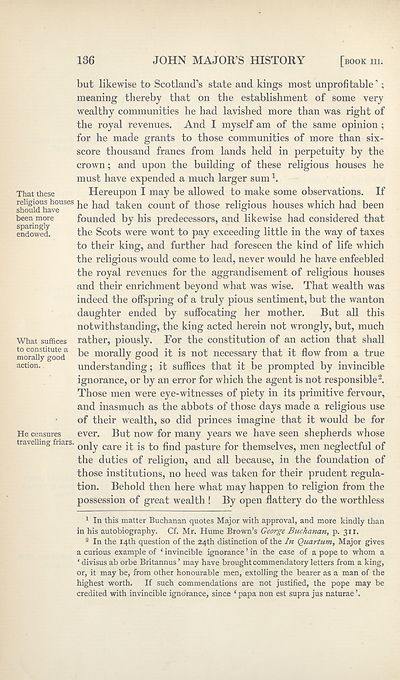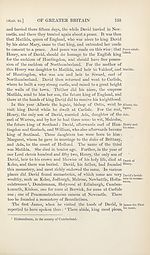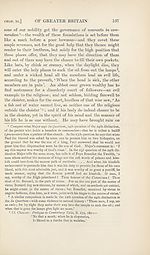Series 1 > History of Greater Britain, as well England as Scotland
(281) Page 136
Download files
Complete book:
Individual page:
Thumbnail gallery: Grid view | List view

136
JOHN MAJOR’S HISTORY [book hi.
That these
religious houses
should have
been more
sparingly
endowed.
What suffices
to constitute a
morally good
action.
He censures
travelling friars.
but likewise to Scotland’s state and kings most unprofitable ’;
meaning thereby that on the establishment of some very
wealthy communities he had lavished more than was right of
the royal revenues. And I myself am of the same opinion;
for he made grants to those communities of more than six-
score thousand francs from lands held in perpetuity by the
crown; and upon the building of these religious houses he
must have expended a much larger sum1.
Hereupon I may be allowed to make some observations. If
he had taken count of those religious houses which had been
founded by his predecessors, and likewise had considered that
the Scots were wont to pay exceeding little in the way of taxes
to their king, and further had foreseen the kind of life which
the religious would come to lead, never would he have enfeebled
the royal revenues for the aggrandisement of religious houses
and their enrichment beyond what was wise. That wealth was
indeed the offspring of a truly pious sentiment, but the wanton
daughter ended by suffocating her mother. But all this
notwithstanding, the king acted herein not wrongly, but, much
rather, piously. For the constitution of an action that shall
be morally good it is not necessary that it flow from a true
understanding; it suffices that it be prompted by invincible
ignorance, or by an error for which the agent is not responsible2.
Those men were eye-witnesses of piety in its primitive fervour,
and inasmuch as the abbots of those days made a religious use
of their wealth, so did princes imagine that it would be for
ever. But now for many years we have seen shepherds whose
only care it is to find pasture for themselves, men neglectful of
the duties of religion, and all because, in the foundation of
those institutions, no heed was taken for their prudent regula¬
tion. Behold then here what may happen to religion from the
possession of great wealth ! By open flattery do the worthless
1 In this matter Buchanan quotes Major with approval, and more kindly than
in his autobiography. Cf. Mr. Hume Brown’s George Buchanan, p. 311.
2 In the 14th question of the 24th distinction of the In Quartum, Major gives
a curious example of ‘ invincible ignorance ’ in the case of a pope to whom a
‘ divisus ab orbe Britannus ’ may have brought commendatory letters from a king,
or, it may be, from other honourable men, extolling the bearer as a man of the
highest worth. If such commendations are not justified, the pope may be
credited with invincible ignorance, since ‘ papa non est supra jus naturae ’.
JOHN MAJOR’S HISTORY [book hi.
That these
religious houses
should have
been more
sparingly
endowed.
What suffices
to constitute a
morally good
action.
He censures
travelling friars.
but likewise to Scotland’s state and kings most unprofitable ’;
meaning thereby that on the establishment of some very
wealthy communities he had lavished more than was right of
the royal revenues. And I myself am of the same opinion;
for he made grants to those communities of more than six-
score thousand francs from lands held in perpetuity by the
crown; and upon the building of these religious houses he
must have expended a much larger sum1.
Hereupon I may be allowed to make some observations. If
he had taken count of those religious houses which had been
founded by his predecessors, and likewise had considered that
the Scots were wont to pay exceeding little in the way of taxes
to their king, and further had foreseen the kind of life which
the religious would come to lead, never would he have enfeebled
the royal revenues for the aggrandisement of religious houses
and their enrichment beyond what was wise. That wealth was
indeed the offspring of a truly pious sentiment, but the wanton
daughter ended by suffocating her mother. But all this
notwithstanding, the king acted herein not wrongly, but, much
rather, piously. For the constitution of an action that shall
be morally good it is not necessary that it flow from a true
understanding; it suffices that it be prompted by invincible
ignorance, or by an error for which the agent is not responsible2.
Those men were eye-witnesses of piety in its primitive fervour,
and inasmuch as the abbots of those days made a religious use
of their wealth, so did princes imagine that it would be for
ever. But now for many years we have seen shepherds whose
only care it is to find pasture for themselves, men neglectful of
the duties of religion, and all because, in the foundation of
those institutions, no heed was taken for their prudent regula¬
tion. Behold then here what may happen to religion from the
possession of great wealth ! By open flattery do the worthless
1 In this matter Buchanan quotes Major with approval, and more kindly than
in his autobiography. Cf. Mr. Hume Brown’s George Buchanan, p. 311.
2 In the 14th question of the 24th distinction of the In Quartum, Major gives
a curious example of ‘ invincible ignorance ’ in the case of a pope to whom a
‘ divisus ab orbe Britannus ’ may have brought commendatory letters from a king,
or, it may be, from other honourable men, extolling the bearer as a man of the
highest worth. If such commendations are not justified, the pope may be
credited with invincible ignorance, since ‘ papa non est supra jus naturae ’.
Set display mode to:
![]() Universal Viewer |
Universal Viewer | ![]() Mirador |
Large image | Transcription
Mirador |
Large image | Transcription
Images and transcriptions on this page, including medium image downloads, may be used under the Creative Commons Attribution 4.0 International Licence unless otherwise stated. ![]()
| Scottish History Society volumes > Series 1 > History of Greater Britain, as well England as Scotland > (281) Page 136 |
|---|
| Permanent URL | https://digital.nls.uk/127735137 |
|---|
| Attribution and copyright: |
|
|---|
| Description | Over 180 volumes, published by the Scottish History Society, containing original sources on Scotland's history and people. With a wide range of subjects, the books collectively cover all periods from the 12th to 20th centuries, and reflect changing trends in Scottish history. Sources are accompanied by scholarly interpretation, references and bibliographies. Volumes are usually published annually, and more digitised volumes will be added as they become available. |
|---|


